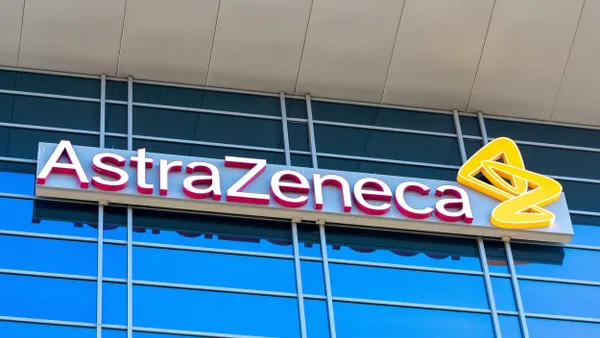Today, a brief rundown of news involving Merck & Co. and AstraZeneca, as well as updates from AbbVie, Stealth BioTherapeutics and Vigil Neuroscience that you may have missed.
A regimen of cancer drugs Keytruda and Lenvima extended progression-free survival over standard chemotherapy in people with a type of gastroesophageal tumor, but did not show an overall survival benefit. The results, announced by Merck & Co. and Eisai Friday, are from a Phase 3 study called LEAP-015 that enrolled hundreds of people with locally advanced unresectable or metastatic HER2-negative gastroesophageal adenocarcinoma. The companies said they are continuing to evaluate the data, which they’ll present at a future medical meeting. The findings do not affect Keytruda or Lenvima’s current approvals, or other trials in the LEAP program. — Ned Pagliarulo
AstraZeneca will invest $570 million in a new office facility in Ontario that will help grow the company’s presence in Canada. The drugmaker already employs more than 2,100 people in Canada — many of whom work on clinical trials — and last year acquired Hamilton, Ontario-based Fusion Pharmaceuticals. The new facility will add more than 700 positions to its workforce there, across “all areas of the business,” AstraZeneca said Thursday. — Ben Fidler
AbbVie will work with San Diego-based biotech startup Neomorph to develop protein-degrading “molecular glue” drugs for cancer and immune diseases, the companies announced Thursday. Neomorph will get an unspecified upfront payment from AbbVie in the deal and stands to receive up to $1.64 billion more in option fees and milestones. It’s the third industry collaboration since last February for Neomorph, which also has partnerships with Biogen and Novo Nordisk. — Ben Fidler
The Food and Drug Administration will take another three months to decide whether it will approve Stealth BioTherapeutics’ drug elamipretide for Barth syndrome. The company on Thursday said the FDA determined it needs more time to review recent information submitted by Stealth following an October meeting of agency advisers. The FDA didn’t cite any safety issues, nor did it request more testing, Stealth said. The new decision deadline is April 29. — Ned Pagliarulo
Shares in Vigil Neuroscience rose by double digits this week after the biotechnology company reported Phase 1 trial data for an experimental drug it’s developing for Alzheimer’s. The data, which detail the drug’s safety and distribution through the body, support advancement into a Phase 2 study, Vigil said. Code-named VG-3927, the small molecule drug is designed to boost a neuroprotective response in the brain to accumulations of tau and amyloid, proteins associated with Alzheimer’s. — Ned Pagliarulo














